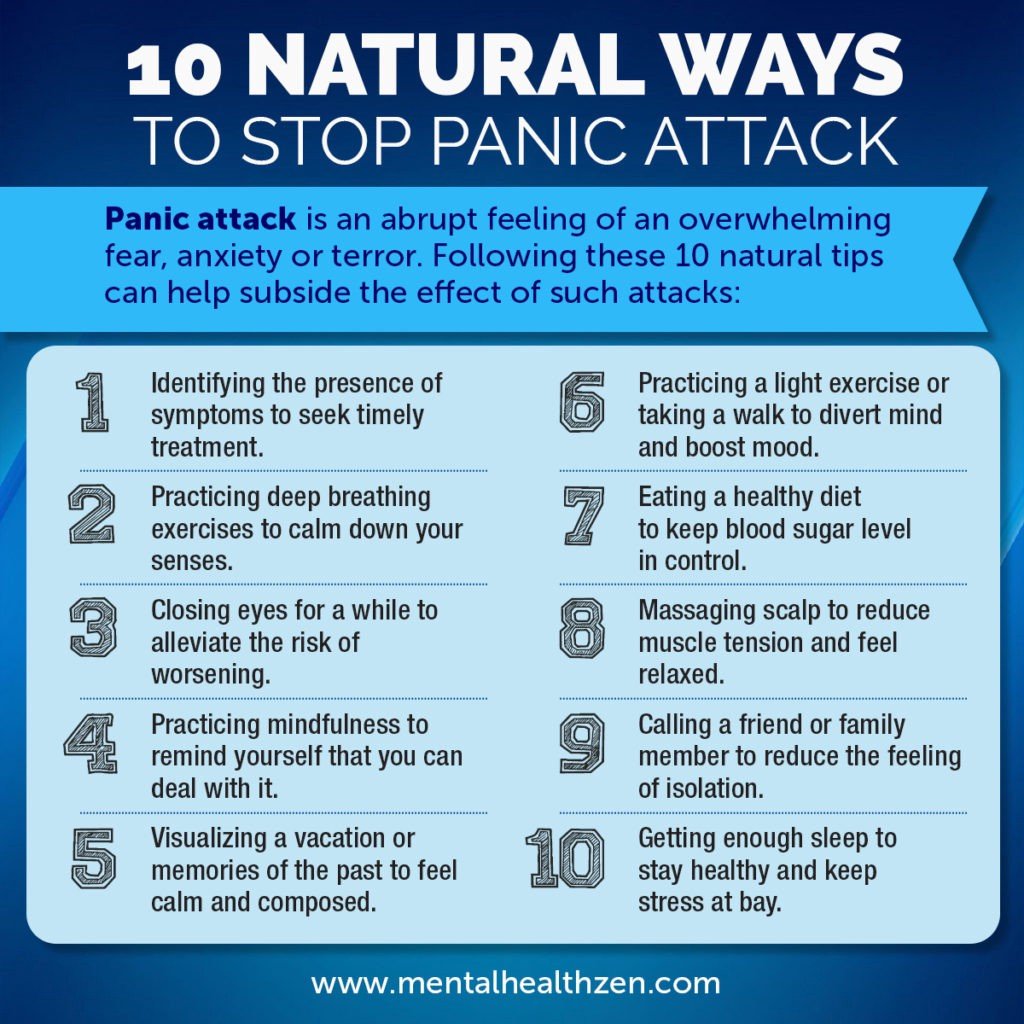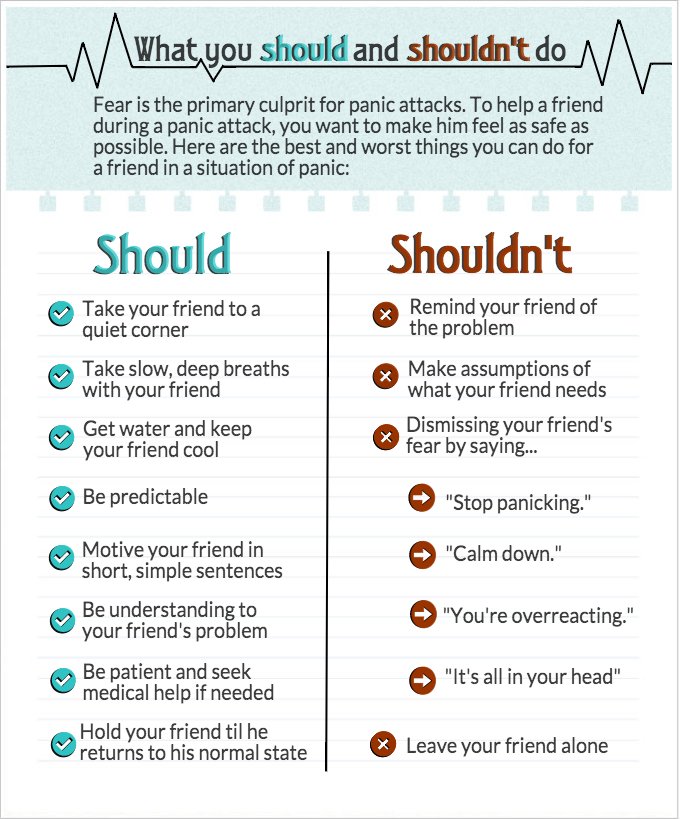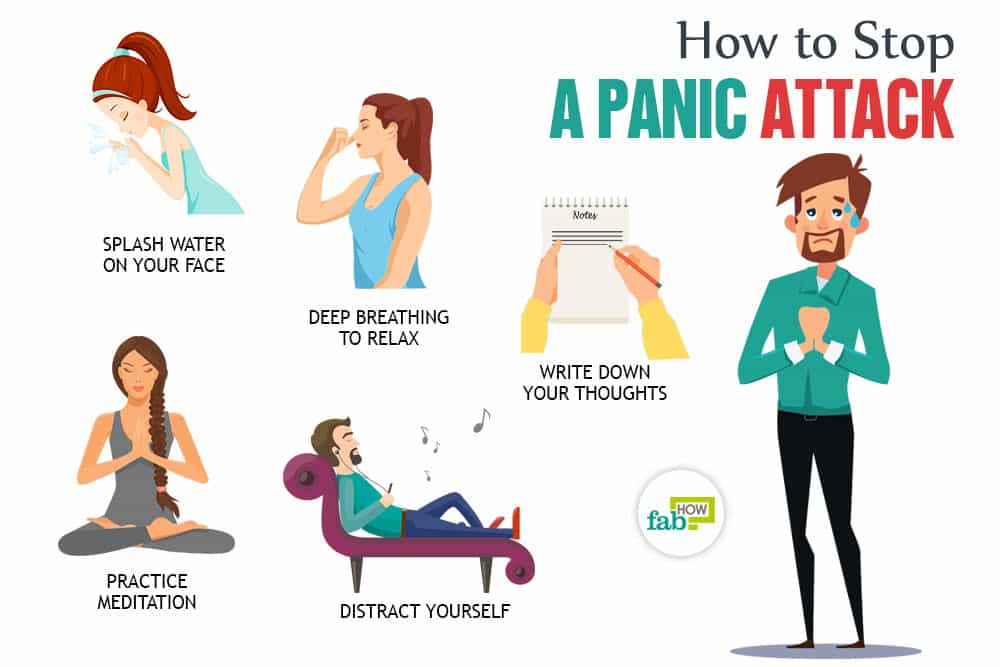Recognize That Youre Having A Panic Attack
Take away the fear that you may be dying or that impending doom is looming, both symptoms of panic attacks. This can allow you to focus on other techniques to reduce your symptoms.
It is not always possible to avoid triggers for a panic attack, but if you know what triggers it, this can help you understand that it is a panic attack and not something else.
Bring Your Focus To Your Breath
Panic attacks often cause racing thoughts that make it feel like you cant focus on anything. It can also cause shallow, labored breathing and a pounding heart rate. You can turn all of these problems around by focusing on taking deep breaths. Start with this strategy, called the 4-7-8 breath, developed by Dr. Andrew Weil
- Exhale completely through your mouth, making a whoosh sound.
- Close your mouth and inhale quietly through your nose to a mental count of four.
- Hold your breath for a count of seven.
- Exhale completely through your mouth, making a whoosh sound to a count of eight.
- This is one breath. Now inhale again and repeat the cycle three more times for a total of four breaths.
If you are able to deploy the 4-7-8 breath early on in the panic cycle, often you can interrupt it before it flares out of control. Remember, though, that the 4-7-8 breath is simply meant to reduce your arousal level. Its not about preventing a dangerous panic attack because, as was explained above, there was nothing dangerous to begin with.
Learn How To Manage Your Anxious Thoughts
Anxiety doesn’t come out of the blue. When you have anxiety attacks, it’s often because your mind tends to spiral into negative thoughts – often without your control. Sometimes you can control this anxiety by keeping these thoughts at bay and learning to dismiss triggers that cause you anxiety.
For many, this is easier said than done. But there are many different strategies you can try that may be effective. These include:
A Question Checklist
When you feel anxious, have a checklist on hand of questions to ask yourself about that anxiety experience. The longer the checklist, the more you’ll find that your thoughts become more realistic. Questions that you can use include:
- Is there a reason to believe something is wrong?
- What evidence is there that something is wrong?
- Is there a chance I’m blowing this out of proportion?
Affirmations
Affirmations not for everyone, but those that do use them find them to be very beneficial. Affirmations are things that you say to yourself to make yourself feel better. These include:
- I’m okay. This is just anxiety and I will get passed this .
- I have a great life and I’m looking forward to tomorrow.
- My anxiety won’t control me.
Getting Used to Physical Symptoms
The latter is known as “exposure therapy” and there are countless ways to create exercises that will habituate you to your panic attack triggers.
You May Like: Childhood Trauma And Bipolar Disorder
I Am Anxious All The Time What Should I Do
The first thing to do is remind yourself that anxiety is a normal response to stress and stress is a daily part of our personal and professional lives.
Its OK to feel anxious. But at the same time, avoiding anxiety and distracting yourself will often make things worse.
Therefore, if you are feeling anxious all the time and you believe that it is getting in the way of your relationships, ability to perform at work, and in your quality of life, you should definitely do something about it.
Your anxiety symptoms can be alleviated with a few simple exercises/techniques. These include breathing exercises, mindfulness awareness exercises, self-safe hypnosis, and progressive muscle relaxation.
Physical exercise such as going for a walk, hitting the weights or doing high intensity interval training at the gym, and yoga and tai chi are effective ways to release repressed emotions. These forms of physical exercise has been shown to help calm your mind. Many people report that they feel as though they have gained perspective post-workout.
When symptoms of anxiety persist over a long period of time, there may be a deeper cause for your anxiety. For example, your constant feelings of anxiousness may stem from unresolved issues within your relationship, or feelings of dissatisfaction with your job or career. It is recommended that you talk to a mental health professional such as a psychologist or a qualified counsellor to help find a solution to your anxiety.
Squeeze A Stress Ball

If you’re prone to anxiety attacks, it might help to keep your hands busy in moments when you feel panic creeping in. You might want to stretch and play with some putty, handle a smooth stone, or squeeze a stress ball, if you have one.
As Masand says, “Keeping something in your hands can help connect you with the present moment and also acts as a stress reliever.”
Don’t Miss: Claustrophobia Meaning In English
Keep Track Of What Makes You Anxious
While panic attacks sometimes feel like they hit out of the blue, Moore suggested keeping a journal to keep consistent track of your anxiety so you can potentially identify any unnoticed triggers.
Over the day, chart your anxiety. Record your activity, giving each part of your day a rating between one 10, with 10 being the most anxiety you are feeling in that moment, she said.
If you can find a pattern to your anxiety, you may be able to pinpoint what is causing your panic attacks so you can stop them in their tracks or reduce their severity, Moore added.
Get To The Root Of The Problem And Stop The Panic Attacks At Work: See A Therapist
Being prepared for a panic attack at work is great, but the best solution is eliminating them. To do this, youll need to investigate the cause of the attacks. Seeing a therapist will help you understand what issues and behaviors are at the heart of your panic disorder.
Panic attacks are the bodys way of shouting that you are ignoring your mind and feelings, Neo said. Getting in touch with them will help.
Also Check: Can High Blood Sugar Cause Anxiety Attacks
Causes Of Panic Attacks And Panic Disorder
Although the exact causes of panic attacks and panic disorder are unclear, the tendency to have panic attacks runs in families. There also appears to be a connection with major life transitions such as graduating from college and entering the workplace, getting married, or having a baby. Severe stress, such as the death of a loved one, divorce, or job loss can also trigger panic attacks.
Panic attacks can also be caused by medical conditions and other physical causes. If youre suffering from symptoms of panic, its important to see a doctor to rule out the following possibilities:
How To Calm Down During And After A Panic Attack
Panic attacks can be draining. Experiencing one can leave you overwhelmed and unsure of what to do. Learn things that can help both during and after a panic attack.
panic attacts are feelings of sudden, intense distress often in response to a stressful situation. They can also happen without warning and for no obvious reason.
Panic attacks typically last from five to 20 minutes but may continue for a few hours. During a panic attack, anxiety levels are usually worse during the first 10 minutes. In addition to anxiety, other symptoms of a panic attack include:
- Feeling like youre having a heart attack, dying, or losing control.
- Feeling detached from reality.
- A racing or irregular heartbeat.
- Difficulty breathing or very fast breathing.
- Dizziness, shaking, or trembling.
- Sweating, chills, or hot flashes.
- Clammy hands.
- Feeling like youre choking or cant swallow.
- Numbness or tingling.
Panic attacks are very common. In fact, most people will have at least one panic attack in their lifetime. Children also can experience panic attacks. Some common causes of panic attacks in children are:
- Being overly afraid of common objects, such as bugs.
- Worrying too much about monsters or about going to bed alone.
- Refusing to go to school or getting unusually upset when separated from a parent.
Recommended Reading: Does Pristiq Treat Anxiety
Keep Your Mind In The Present
Notice five things you can see around you. Then, four things you can touch. Three things you can hear. Two things you smell. One thing you taste. When you stay grounded in whatâs going on around you, it gives your mind something better to do than focus on fear or bounce from one worry to the next.
Take Control Of Your Breathing
Panic attacks can also cause rapid breaths and dizziness. A guided meditation or mindfulness exercise can help regulate that response, and it also gives your mind something to focus on other than the panic itself, Moore said.
She suggested downloading an app like Insight Timer or Headspace, which both provide exercises that will help you take control of your breathing. Or, just practice by inhaling for a few moments then slowly exhaling. The ultimate goal is to help calm your body through really slow, deep breaths, which will send your body the message to calm the other physical effects of the panic attack, Moore added.
Recommended Reading: Can Anxiety Cause Dehydration
Dunk Your Face In Cold Water
While it may sound strange, dunking your face into a bowl or sink full of cold water can help stop a panic attack in its tracks.
“Research in physiology suggests that the human heart rate slows down 10 to 25 percent when our face comes into contact with ice cold water,” Forshee says. “This is affective during a panic attack because when we are experiencing panic our body physiologically becomes aroused .”
It may be tricky to come across a bowl of ice water while out in public, but this may be a good one to try at home.
I Think My Partner Has Anxiety What Should I Do

People with anxiety often know that they are feeling anxious all the time. As you will know, different people react differently to personal feedback and when it comes to addressing anxiety, quite often, partners can aggravate the situation despite their good intentions.
Here are a few tips to show that you care and are empathetic to their feelings of anxiety:
You May Like: Three Phases Of Schizophrenia
How To Stop Panic Attacks At Night
Getting a good nights sleep is essential for our health and wellbeing. Sleep promotes rest and relaxation, and gives us a chance to recuperate and let go of the stresses of the day. However, this isnt the case for the many individuals who struggle with panic attacks at night.
Here, we provide advice on how to cope with panic attacks at night, and give tips on how to reduce them.
Who Gets Panic Attacks
At least 6 million Americans suffer from panic attacks and panic disorder both conditions classified as anxiety disorders. According to the Anxiety and Depression Association of America , about 2-3% of Americans experience panic disorder in a given year and it is twice as common in women as in men. Panic disorder typically affects individuals when theyre in their 20s but is also seen in young children, adolescents, and older adults.
Read Also: Ashley Olsen Anorexic
How Do I Calm My Anxious Child
Anxiety and panic share some common symptoms. When your child is experiencing a panic attack or is feeling particularly anxious, follow these steps.
- Be calm yourself. Its not about you.
- Acknowledge that their feelings are real instead of punishing/shaming them for how they feel.
- Practice chest breathing together to encourage their parasympathetic nervous system to do its thing.
- Tell them that you are there for them by saying, I am here for you.
- Give them a long hug .
Causes Of Anxiety Fear And Panic
There are many different causes of anxiety, fear or panic and it’s different for everyone.
When you’re feeling anxious or scared, your body releases stress hormones, such as adrenaline and cortisol.
This can be helpful in some situations, but it might also cause physical symptoms such as an increased heart rate and increased sweating. In some people, it might cause a panic attack.
Regular anxiety, fear or panic can also be the main symptom of several health conditions. Do not self-diagnose speak to a GP if you’re worried about how you’re feeling.
Read Also: Phobiadefinition
Panic Attacks What Are They
If you suffer from panic attacks, you know theyre more than just a feeling of fear. The truth is, panic attacks actually stem from a larger, more complex anxiety disorder known as panic disorder. This disorder, which comes from a physiological response to one or more triggers, is characterized by repeated panic attacks that cause you to experience overwhelming fear, even though theres nothing around you thats life-threatening or dangerous.
You may experience these attacks anywhere and anytime while driving, at home sleeping, shopping, or at dinner with friends. They usually come on suddenly, and the intensity peaks within just a few minutes. Some of the symptoms of a panic attack include:
- Heart palpitations
- Tingling or numbness
- Shortness of breath
One of the biggest fears you may experience with this disorder is the probability of more attacks. This may cause you to avoid anything you think may trigger such an attack, which can narrow down your activities and interfere with your quality of life.
Know What To Do For Calming A Panic Attack
Now you have some effective ways of calming a panic attack.
We understand its a highly unpleasant and scary thing to go through, which is why we hope the above tips have helped. But one of the most important things in handling an anxiety attack is to have the aid of a professional therapist.
With their help, you can learn even more effective ways of dealing with these panic attacks so they arent as detrimental to your life. In addition, they can help you pinpoint your sources of anxiety and give you effective ways to deal with them so your chances of anxiety attacks are decreased for the future.
Recommended Reading: Stress-induced Hyperglycemia
When To Seek Help
Panic attacks can be frightening and disorienting. If someone is worried about a panic attack, they can talk to their doctor for advice and reassurance.
Recurring or severe panic attacks can be a symptom of panic disorder. This condition affects 23% of people in the United States each year.
A person may want to talk to a healthcare professional if their panic attacks:
- are recurring and unexpected
- are getting in the way of daily life
- do not pass with home coping methods
A doctor can talk a person through both short-term coping methods and long-term treatment options.
The symptoms of a panic attack can resemble those of a heart attack. These include chest pain, anxiety, and sweating. If someone suspects a heart attack or stroke, the person needs immediate medical attention.
What Causes Night Time Panic Attacks

While nocturnal panic attacks can be sudden and frightening, theyre actually a common mental health condition. So what causes them?
So far, research hasnt found a single, clear-cut reason for why people experience panic attacks at night. However, we do know that the brain doesnt switch off during sleep, so its possible for any pent-up worries or anxieties to manifest in our unconscious brains, causing a nocturnal panic attack. Also, struggling with day time panic attacks makes it more likely that you will experience panic attacks at night.
Research suggests there are a number of other factors that could increase the risk of someone suffering from both day and night time panic attacks. These include:
Also Check: Can You Blackout During A Panic Attack
Execute The Aware Technique
The Aware technique is a great way to overcome anxiety and panic attacks. Its the process of
A accepting your panic attack symptoms
W watching your attack, as if you were someone else looking in
A acting like nothing is happening
R repeating steps until you relax
E expecting the best by eliminating negative thinking
Accepting your panic attacks keeps you from feeding into the fear, which will only prevail the attack.
Watching your attack, as if you were someone else looking in allows you to see that theres nothing wrong. You arent acting funny or appearing abnormal to anyone else. No one knows youre having a panic attack except for yourself.
Acting like nothing happening, again, keeps you from feeding into the fear. Dont run. Just sit, accept, and continue doing whatever it was you were doing before the attack came on.
Repeating is all about repeating the steps as needed. If you start to feel panic again, start at A.
Expecting the best will help eliminate the negative thoughts that can keep you in a panic attack or worse keeping you down and out because of a panic attack. Nothing bad is going to happen. Just roll with the waves and the sea will float you back to the surface.
Stopping Panic: What To Do When Youre Having A Panic Attack
Here, some strategies that have worked for others that may help you:
Read Also: What Is The Fear Of Vomit Called